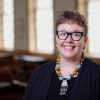In mid-July, I attended the Cambridge University Press & Assessment North American Librarian Advisory Board meeting in New York City. This was our first in-person meeting since 2019 and it was wonderful to be back together for two days of engaging conversation about research and learning. I’ve been on the board since 2017, with many of the same members, so our meeting felt more like a reunion than a meeting. Much of what we discuss is confidential, as Cambridge will seek our input on new directions and products, but I can say that the Cambridge team–which includes staff from both the New York and Cambridge, England offices–genuinely welcomes our feedback (criticisms included) and responds to our suggestions (even if only to explain why they aren’t adopting them).
Day 1 focused on open research and transformative agreements. Wake Forest has a transformative agreement with Cambridge through the Carolina Consortium, which gives Wake faculty the opportunity to publish their articles open access with no additional cost incurred by the author; all OA publishing costs are underwritten by ZSR in our transformative agreement. We heard updates from Cambridge on their open access agenda and discussed the role of transformative agreements in present and future support for open research. Day 2 focused on teaching and learning landscapes, looking at how higher ed is changing at large, how librarians and publishers can work together to support changes in teaching and learning, the role of textbooks and courseware, and how Cambridge is responding to these changes.
One of the things I appreciate and most enjoy about our meetings are presentations from fellow board members on the topics at hand. On the first day, three members spoke about how to best engage faculty around open access publishing: what’s worked, what hasn’t, and what future engagement might look like. While I knew that Wake faculty’s opinions of and engagement with open access are fairly typical and that outreach challenges are not ours alone, it was still reassuring to hear that faculty at other institutions have similar reactions to OA. On the second day, I had the pleasure of co-presenting the first session with Amy Archambault, the Assistant Director of Instructional Design in the Office of Online Education here at Wake, who joined the presentation virtually. Amy and I were tasked with speaking about the changing landscape of higher education (slides here) in just 40 minutes, which was a rather tall order! We did it, framing our discussion through library and online ed lenses, looking at impacts on students, faculty, and institutions. We both felt the presentation went well and based on the thanks we received from the Cambridge team, we met their expectations. Many, many thanks to Amanda Kauffman and Kathy Shields for sharing their thoughts on these changes; their insights and opinions were wonderfully helpful and informative! Unfortunately, I had to leave early on the second day, as my flight time got moved up (better than getting cancelled), so I had to miss the Cambridge-specific update. I look to reading the meeting minutes from that final session.
Oh, and that skull I referenced? Cambridge publishes Cambridge Shakespeare, a collection that includes plays and notes, reference material, and related multimedia, and all the board members received a promo skull stress ball. It is now keeping an eye (socket) on me while I work. “Alas, poor Yorick!”

2 Comments on ‘Molly goes to New York to get a skull (not really, but sort of really)’
Thank you for sharing Molly! I found the slides for your presentation with Amy illuminating especially the demographics of Wake Forest students and the trend that male college enrollment is declining. The statistics on the summer online enrollment before the COVID lockdown, during the COVID lock down, and living with COVID still persisting was interesting.
Thanks for your summary. The conference sounds productive! And what a great location, interesting discussion, and fabulous giveaway!